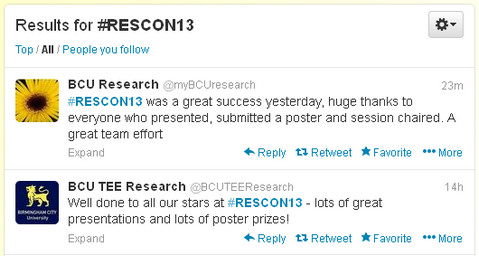Birmingham City University recently held its 2013 version of RESCON and I delivered a short presentation on an aspect of our contract cheating research. This is an internal conference, bringing together the breadth of research across Birmingham City University.
Whilst there was some excellent research presented, showing the skill base of both the Birmingham City University staff and research students, I also noticed many presenters who were not able to work within the particular constraints of this event. The most notable constraint? A firm 10 minute time limit to presentations, with a very tight schedule, and potentially allowing for some handover time. The other constraint? A multidisciplinary audience, who don’t have qualifications in most of the fields being presented.
Research Mistakes
Because of this, I also observed several mistakes which should never have happened with professional presenters. People pitching their talk at completely the wrong level, or requiring advanced subject skills to understand it. Presenters just wanting to give a talk they gave at another conference with a 30 minute slot, and finding themselves cut off at the methodology section. And, generally, just bad presentation skills, people reading from scripts, mumbling, and suffering from poor slide design.
I can’t immediately solve the poor presentation skills that are inherent around research conferences (one would think that would be a core skill for anyone working in or considering a career in academia), but there are plenty of books and courses in that area.
What I can do is look at the core techniques designed to succeed in a research setting like this, and the motivation behind it.
How To Give More Suitable Short Research Presentations
First of all, the main reason to present at an internal conference like this is publicity. It’s all about keeping your name and research visible around the university and trying to grow the connections which will help to take it to a wider audience. This isn’t the place to debut massive research studies. This isn’t a research conference with a paper attached (these types of conferences do hold value within the Computing field). It’s a place to make connections.
Second, plan to base the talk about an aspect of your research which will make sense to all disciplines. The table showing detailed research findings in a tiny font can wait. Think of something that is accessible and which delegates can understand the basics of. For instance, I watched a presentation on music, where a piece of sheet music was projected and several features of that music were verbally explained. Assuming that most of the audience could not read sheet music, that could have been improved by playing the music.
Third, focus the talk around one idea. One small aspect of the work where a visible result can be presented (the results are generally more interesting than a detailed methodology). I saw an excellent example of this looking at fatherhood as a much larger portion of a PhD study. No technical consideration, but enough examples of results from the research, and quotes from participants, to make this accessible to an audience outside of the Health Faculty. If people are interested further in the research, provide them with a link to your other publications, or an offer to present a longer research seminar, and you’ll cover both audiences.
Fourth. If you’re inexperienced giving research presentations, particularly with this style, review the planned presentation with someone with more experience first. This is true especially for research students, who have the immediate benefit of having a research supervisor available to held them and to fulfill this role.
Think About Research Presentations Like This…
If you take one thing away from this post, make it to present one single accessible idea. Add the short set of interesting slides to your SlideShare account and the rest of your Professional Online Presence and use this to draw people in to the interesting areas of research that you’re working on.


